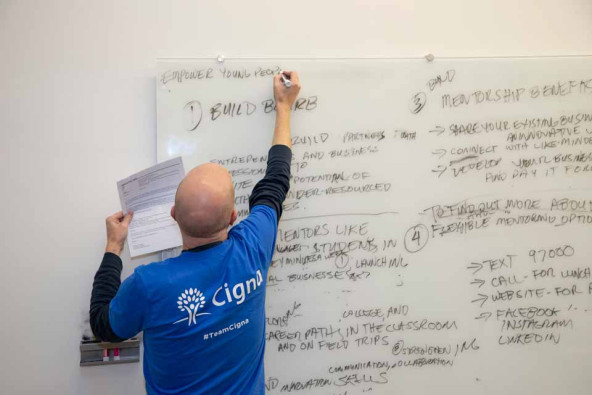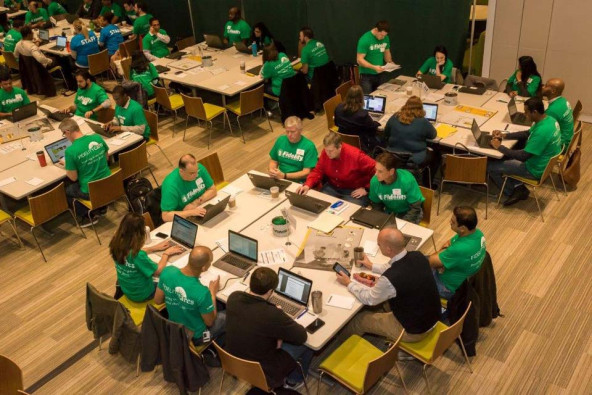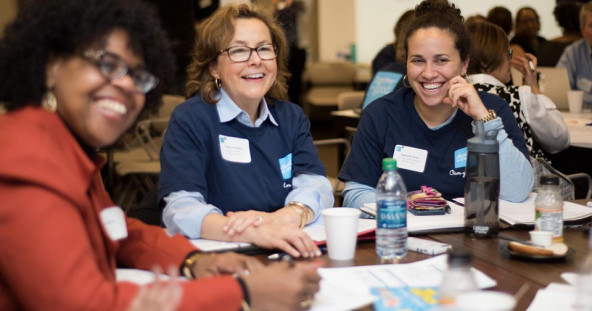 A volunteer documents new ideas to help a nonprofit build capacity during Skills for Cities Boston, a flash consulting event that delivered an estimated $80,000 in Social Return on Investment for the community. (Photo by Will Harrison)
A volunteer documents new ideas to help a nonprofit build capacity during Skills for Cities Boston, a flash consulting event that delivered an estimated $80,000 in Social Return on Investment for the community. (Photo by Will Harrison)
Service days are an important part of many traditional corporate volunteer programs. These days are intended to deepen engagement with a company’s nonprofit partners and create opportunities for their employees to make a tangible impact in their communities in a relatively short amount of time. Employees often give their time, participating in activities like building new homes, sorting supplies at a food bank, or cleaning up a park or beach. But while this model is popular, it doesn’t always address one of the nonprofit sector’s greatest needs—capacity building.
This is where skills-based volunteerism can help. Skills-based volunteerism encourages professionals to donate their business expertise in areas such as human resources, technology, marketing, or finance, to build new skills and capacity for nonprofits that often lack the financial or staff resources for these essential functions. Ultimately, skills-based volunteering maximizes the value of employee hours spent in the community by asking them to do what they do best.
Pro bono service continues to be one of the fastest growing trends in corporate volunteerism. More than 50 percent of companies offer some type of pro bono program to complement more traditional direct service models and philanthropic investments, according to the CECP’s 2018 Giving in Numbers report. These programs are timely, as capacity building in the social sector is sorely needed. At Common Impact, we estimate that nonprofits spend just 2 percent of their overall budget on core business functions, compared to an average of 35 percent in the corporate sector. More and more nonprofits—an estimated 77 percent or more—are challenged to keep pace with growing demand for programs and services, according to the Salesforce Nonprofit Trends Report 2018. And at the same time, a 2017 California Association of Nonprofits survey found that nearly two-thirds of nonprofits that receive government funding anticipate a reduction in that support given the current climate of greater constituent need and more limited federal resources.
So how can the social sector partner with business to create a service day model that delivers capacity building support for nonprofits that wouldn’t otherwise be able to resource those needs? And how can business meet the demand of their employees who seek a more authentic way to develop skills and collaborate with their colleagues and community? Days of skilled service, that pair business professionals with nonprofit leaders to help solve real community challenges, are one answer.
Are you enjoying this article? Read more like this, plus SSIR's full archive of content, when you subscribe.
Longer term skills-based volunteering projects have their own benefits, including the ability to provide deep consulting and deliver significant value to the social sector, while enhancing the skills and talents that employees bring back to their desks.
But the following three models for day of service programs, sometimes referred to as hackathons or flash consulting, can also deliver community and business impact, while increasing employee engagement and retention in a model that requires less initial commitment from for all stakeholders involved.
Transforming the Hackathon
Technology is a common pain point for nonprofits large and small. Fidelity Investments partnered with Common Impact to launch Tech Impact Week in 2015 as a way to solve some of these IT-related challenges. The annual wide-scale hackathon-style event pairs nearly 450 Fidelity technologists with more than 65 nonprofit organizations to build IT capacity and acumen. This day of IT-focused service also helps Fidelity volunteers identify technology challenges that require longer-term support. The team then provides continued support to interested nonprofit partners through a four to six-month consulting engagement as part of Fidelity’s ongoing skills-based volunteer program. Pairing a quick impact support model with a longer-term approach allows Fidelity to support a high volume of nonprofits while also maintaining deeper community relationships and uncovering new partnerships.
 A team of Fidelity Investments technologists consult with a nonprofit partner as part of Tech Impact Week, a series of skilled days of service designed to not only build the IT infrastructure of social sector organizations, but also build the talents of participating volunteers. (Photo courtesy of Fidelity Investments)
A team of Fidelity Investments technologists consult with a nonprofit partner as part of Tech Impact Week, a series of skilled days of service designed to not only build the IT infrastructure of social sector organizations, but also build the talents of participating volunteers. (Photo courtesy of Fidelity Investments)
“Many people do not realize that Fidelity Investments employs more than 10,000 technologists,” said Roger Stiles, head of technology and global services at Fidelity Investments. “Tech Impact Week not only provides hands-on, customer-focused training and development for our next gen technologists, but it also provides an opportunity for Fidelity to make a tangible impact in the communities in which we live and work.”
 Skilled volunteers and leaders from across Charles Schwab provide consulting services to community nonprofits through the Schwab Pro Bono Challenge, an annual event designed to solve social sector capacity challenges in a short timeframe. (Photo courtesy of Charles Schwab)
Skilled volunteers and leaders from across Charles Schwab provide consulting services to community nonprofits through the Schwab Pro Bono Challenge, an annual event designed to solve social sector capacity challenges in a short timeframe. (Photo courtesy of Charles Schwab)
Building Collective Infrastructure
In 2013, Common Impact and Charles Schwab launched the Pro Bono Challenge. With this day of skilled service model, Schwab volunteers provide nonprofit leaders with capacity building resources in a flash consulting format. The event takes place in Schwab offices in nine different regions and engages senior leaders from across business units and functions to deliver a day of consulting services to nonprofits from the Schwab network of grant partners, volunteer organizations, or employee nominations. Each project is scoped to address a pressing nonprofit capacity challenge in areas such as HR, marketing, operations, or technology, and can be completed successfully within the short timeframe. Some pre-work takes places to ensure that time spent together at the consulting session is maximized and all participating nonprofits walk away with a focused project deliverable and concrete next steps. An estimated 75 percent of participating nonprofits are involved over multiple years, and many of these organizations also receive financial support through small grants or direct volunteer service throughout the year.
The Pro Bono Challenge has also sparked opportunities for investment in collective infrastructure. Schwab and Common Impact identified common themes to the challenges that participating nonprofits were facing, and the solutions that the Schwab teams were delivering—particularly for chapters of the national Boys & Girls Club organization. Following last year’s Pro Bono Challenge, Boys & Girls Club leadership saw the need for a playbook that could help clubs across the United States align their activities with the overarching Boys & Girls Clubs of America 2025 strategic plan. In partnership with Schwab, Common Impact created the Clubs Helping Clubs Playbook, which is now broadly distributed as a resource to local leaders who are tasked with providing direct service to kids while juggling many administrative demands with limited time and resources. The playbook includes tools, templates, resources, and case studies developed for and with local clubs and was designed to specifically support capacity building in areas such as IT, human resources, marketing, and revenue development.
“Many Boys & Girls Clubs face similar business challenges on a local level,” said Tim Hogan, national director of corporate and cause partnerships at Boys & Girls Clubs of America. “By partnering with Charles Schwab and Common Impact we will be able to help Boys & Girls Club organizations customize and operationalize a common strategic vision, which will ultimately strengthen the capacity of clubs across the country.”
A Citywide Model
In September 2018, Common Impact partnered with SVP Boston and Impact2030 to test a new model for cross-company collaboration through citywide skilled service. Together we launched Skills for Cities in Boston and delivered promising results for more than 80 corporate volunteers, representing 14 companies, and 15 nonprofit partners while supporting tangible progress on the United Nations Sustainable Development Goals. The model was created to activate skills-based volunteerism as an on-going tool for social change and remove perceived barriers to pro bono service such as lack of budget or time. By bringing multiple companies together, the Skills for Cities model aims to unlock new collaboration and connection points that could magnify the event’s impact and scale.
Skills for Cities delivered an estimated $80,000 in pro bono services to the Boston community in just one day. Perhaps more importantly, it led to new partnerships that will ensure long-term impact and engagement. More than 70 percent of volunteers indicated that they will continue to lend their professional skills to the nonprofits they met at the event and more than 90 percent of nonprofits reported making a new connection. Nearly 80 percent of participating nonprofits reported that the work completed during Skills for Cities will improve their organization’s capacity. And more than 90 percent of volunteers say that work with a cross-business team was useful in developing their own professional skills.
“Every company has its own way of doing things and to learn from one another was a key takeaway for me,” says Christine Rubio, a volunteer with Harvard Pilgrim Health Care. “I loved working with folks from other companies to help solve a nonprofit challenge and would recommend doing it this way again.”
Designing an Effective Day of Skilled Service
While each of these examples takes a slightly different approach, there are some commonalities that have led to their success.
First, preparation is critical. In order to capitalize on their short-time together, both nonprofits and corporate volunteers should commit to investing time before the day of service to connect and transfer knowledge that will inform the group and ensure that time spent together is used productively. While the majority of the consulting work takes place on the day of skilled service, volunteers should meet with nonprofit leaders virtually in advance of the event to better understand the nonprofit’s strategic challenges and mission. Volunteer teams will often meet again as a group to research solutions, divide tasks based on expertise, and further prepare for the event. For example, in the case of Skills for Cities Boston, volunteer teams were paired with nonprofit partners about a month before the event and completed a virtual orientation to skills-based volunteering to prepare both organizations for the day ahead, allow the volunteers to learn more about the nonprofit’s issue focus, and organize and delegate pre-event work.
Second, source appropriate nonprofit partners and corporate volunteers. Not every nonprofit is able to engage in a skills-based volunteer project and may not benefit from the flash consulting model. The same holds true for corporate volunteers. When engaging in this short-term work, companies should identify employee groups that are ready to volunteer their specialized skills to a nonprofit and ensure that these employees will be provided adequate time away from their day jobs and management support to fully engage in this work. Both sides must come to the engagements with a learning mindset. Nonprofit leaders must be committed to investing the time and budget—not to mention the transparency (and sometimes vulnerability with a corporate partner)—needed to build the capacity of their organizations. Likewise, corporate professionals have as much to learn from those nonprofit leaders as they have to give. Engaging partners that respect the unique meeting of the minds these engagements represent is critical to their success.
Third, scope and staff the capacity building project appropriately. Nonprofits should also identify an appropriate pro bono project that will effectively address capacity challenges and leverage the unique skills of their volunteers in the shorter timeframe. Those projects can range from high level and strategic (defining an expansion strategy, honing a strategic plan) to tactical and deliverable oriented (developing an evaluation dashboard or a piece of marketing collateral), but they must be realistic and tightly scoped to fit within the bounds of the day and the expertise that the corporate team brings to the table.
Finally, use the short-term opportunity to create long-term engagement. Nonprofits and corporate partners should seek ways to deepen engagement through ongoing volunteer opportunities. The best flash consulting events produce not only a solution to the nonprofit challenge of the day, but also engage new board members, advocates, volunteers, and funders that can continue to provide valuable contributions to the organization and the community.
As an organization focused on connecting talented employees to impactful nonprofits with capacity challenges for more than 20 years, we are excited about the recent rise in interest for skilled volunteerism and know that all skills-based programs hold tremendous promise for both volunteers and the community nonprofits they support.
Organizations looking to develop their own skills-based volunteer program or expand their current offerings can download our free Skills-Based Volunteerism Toolkit to maximize the value of pro bono service or access additional resources online.
Support SSIR’s coverage of cross-sector solutions to global challenges.
Help us further the reach of innovative ideas. Donate today.
Read more stories by Danielle Holly.

